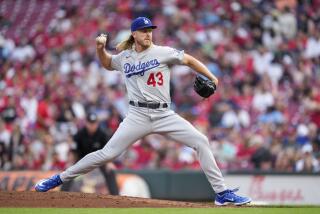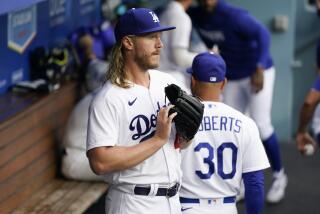Sandberg Leaves After 15 Seasons and No ‘Series’
- Share via
The late summer sun sends shadows across Wrigley Field. The Chicago Cubs end yet another losing season. But there’s something different in the familiar scene: These are the last days at second base for Ryne Sandberg.
Quiet and unassuming for a player with Hall of Fame credentials, Sandberg is enjoying the twilight of his 15-year career, even though this season, like all the others, will end without a trip to the World Series.
His teammates are savoring his company, his clubhouse jokes and pranks, for four more weeks. Other teams are recognizing him on his unofficial farewell tour. And, given the Cubs’ lackluster pitching, opponents have had plenty of chances to wish him luck as they often reach second or circle the bases.
The season has been a disaster, even by Cubs standards. The team that hasn’t been to a World Series since 1945 lost its first 14 games and is headed to an embarrassing win-loss record.
It’s not the way Sandberg wanted to go out when he ended the retirement that began in June 1994 and lasted a year and a half.
“That makes it tough,” he said as he sipped coffee and pulled on his uniform in the Cubs locker room. “But I’ve been through those times before. Some times that’s the way it goes, and you really can’t do a whole lot about that.”
Unlike Michael Jordan, the other No. 23 who retired in Chicago and then returned, Sandberg’s second coming hasn’t even come close to a championship.
“I didn’t go in and say this is what I would do,” Sandberg said, reflecting on a comeback that started last season with surprising power--25 homers and 92 RBIs with a .244 average.
“Last year was a little bit different than this year. I had some pretty good power numbers last year, and the team had a chance right up until the last three weeks of the season.
“This year has been a struggle all year.”
In 18 games after his Aug. 2 retirement announcement, a relaxed Sandberg showed flashes of a 10-time All-Star who has more homers than any other second baseman. He batted .367 with five homers and 10 RBIs in that span.
And after a miserably slow start that led to a brief stint on the bench, he raised his average to .268 with 10 homers and 50 RBIs.
His first retirement came during a tumultuous chapter of his life. He was unhappy with his own performance, disillusioned by the way the team was being run by then-general manager Larry Himes and beset by problems in his first marriage.
But after sorting out his personal problems, and encouraged by the team’s new direction under different management, Sandberg decided to return.
Clearly, though, the man who is perhaps the game’s greatest fielding second baseman is not the player he once was as he nears his 38th birthday on Sept. 18.
“Everyone jumped on the wagon that he can’t play anymore,” said shortstop Shawon Dunston, who once himself criticized Sandberg for not diving for ground balls.
“He has made everybody in Chicago happy, and now it’s time for him to be happy, go out on a happy note, and here there are people writing he doesn’t have it anymore. I don’t think that’s right. I’m glad I was his partner. Usually it’s the second baseman who’s the shortstop’s partner, but in our case I’m his.”
Sandberg, the 1984 MVP, isn’t worried about anyone else’s view of his retirement or comeback. His biggest regret after a long career is that like so many great Cubs players, he has missed out on the game’s ultimate showcase.
“I heard Ernie (Banks) say that. I have said it,” Cub Hall of Famer Billy Williams said.
“Andre Dawson said that after me. (Ron) Santo said it, and now I’m hearing Ryne Sandberg say it. I think if you talk to any player who had outstanding years here, that’s the thing they wanted to do--get in the World Series.”
Sandberg, who batted .385 in Cubs’ playoff trips in 1984 and 1989, laments it, as well. When he’s finished Sept. 28, he will have played on just three winning teams with the Cubs since joining them in 1982.
“That’s really the only thing I feel I missed. I had fun playing this game, I’ve enjoyed just about everything I could possibly enjoy except for not being in the World Series,” he said.
“I regret that, not only for myself, but for the fans who come out here every day. And just not having a World Series here at Wrigley Field, that’s kind of a shame.”
Even during the years of losing, Sandberg never changed his approach to the game. He came early and prepared to play.
“He never missed a day of work,” first baseman Mark Grace said. “He never missed a day of ground balls, of batting practice, even when he was fatigued or if it was hot or whatever.”
“He hit more home runs than any second baseman in the game, and he didn’t stand there and admire them and watch them, and he doesn’t show up an opponent,” Grace added.
“It was his professionalism,” Dunston said. “There are not many professionals in the game anymore, who play the game like it’s supposed to be played. You don’t show up anybody; you’re not waving at cameras after you hit a home run.”
In the clubhouse, the otherwise low-key Sandberg is a notorious prankster. Hot foots were one of his specialties, says former teammate Rick Sutcliffe.
“He had this one butane thing that would send a plume of flames of about two feet so he could get you from long distance,” Sutcliffe said.
When rookie third baseman Kevin Orie went on an injury rehabilitation assignment this year, he opened up his traveling bag to find it brimming with every souvenir imaginable, like coffee mugs and key chains. Compliments of Sandberg.
“He always throws a pleasant surprise in my locker every other day, so it keeps on your toes,” said Orie.
Sandberg, who left a $7 million-per-season contract after 57 games in 1994, had a base salary of $3.25 million this season. There had been a team option for $3.25 million for 1998 that was guaranteed if Sandberg played 130 games this season.
But when Sandberg told Cubs management he was retiring, the contract was restructured for the 1997 season only.
Asked what he would miss about the game, he didn’t mention the money.
“I’ll miss taking the ground balls, taking batting practice and trying to get a hit in the game, those type of things,” he said. “I feel very comfortable about leaving the game at this point, and I have other things I definitely want to be involved with.”
How about the Hall of Fame?
“I started to hear things about the Hall of Fame in the mid ‘80s. I never have thought a whole lot about it,” he said.
“I’m just thankful and grateful for the career I’ve had.”
More to Read
Go beyond the scoreboard
Get the latest on L.A.'s teams in the daily Sports Report newsletter.
You may occasionally receive promotional content from the Los Angeles Times.










